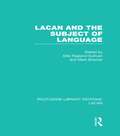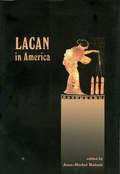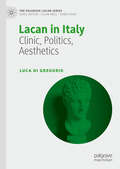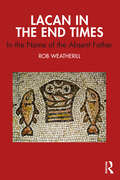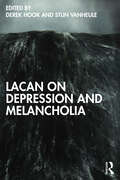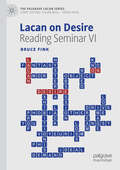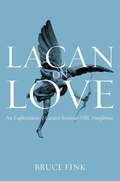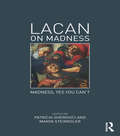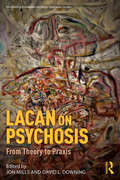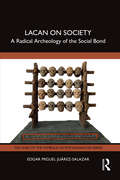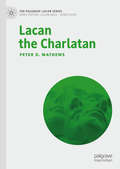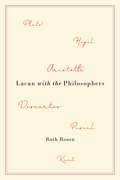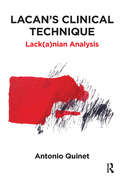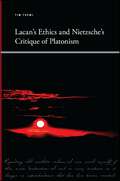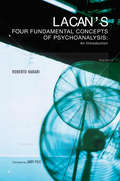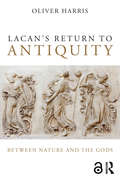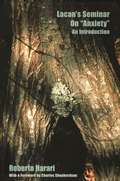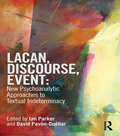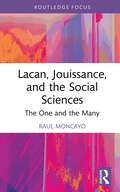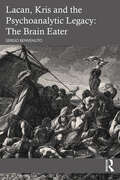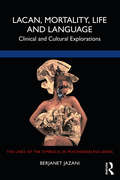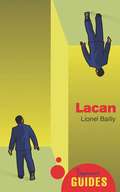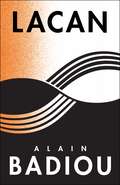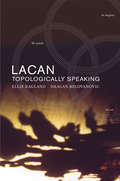- Table View
- List View
Lacan and the Subject of Language: Lacan: Lacan And The Subject Of Language (Routledge Library Editions: Lacan)
by Mark Bracher Ellie Ragland-SullivanOriginally published in 1991, this volume tackles the diverse teachings of the great psychoanalyst and theoretician. Written by some of the leading American and European Lacanian scholars and practitioners, the essays attempt to come to terms with his complex relation to the culture of contemporary psychoanalysis. The volume presents useful insights into Lacan’s innovative theories on the nature of language and the subject. Many of the essays probe the importance of psychoanalysis for problems of signifier and referent in the philosophy of language; others explore the difficulties men and women have in negotiating the sexual differences that divide them. A major contribution to the new reception of Jacques Lacan in the English-speaking world, Lacan and the Subject of Language will challenge those who believe that they have already ‘mastered’ Lacanian thought. The insights offered here will pave the way for further developments.
Lacan in America (Lacanian Clinical Field)
by Jean-Michel RabateThis interdisciplinary compilation of essays is a welcome tonic for the “jet lag” or cultural gap between Lacanian discourse's warm reception in Latin countries and the resistance Lacanian clinical applications have met with in the Anglophone world. Lacan in America illuminates important and dynamic debates within a cultural context that Lacan himself has modified. Rather than a made-simple approach, this dynamic collection invokes some of the hesitations, contradictions, and evolutions that appear to be the most exciting part of his legacy, in “polylogical” discussions by “Lacanians” who are not averse to a critical reexamination of major concepts or textual and political issues. Topics include: a regressive sexual science and a “postmodern condition,” technological mediation through seduction and resistance, the partisan issues beneath some of the resistances met by Lacanian discourse, and Lacan's revelations as responses to Freudian riddles.Demonstrating the vitality of Lacanian thought and its impact on disciplines, from mathematics to gay/lesbian studies, Lacan in America works to edify the fruit of Lacan's endless revision, an infinitely propagated transfiguration of his search for the meanings of truth. “Lucid and nonpartisan?[this collection] successfully takes the ideas and issues at the heart of Lacan's work and legacy and reinspects them through the lens offered by their transportation across the Atlantic, illustrating what has happened to them in their translation--and mistranslation--into and through American intellectual and cultural life.”-Daniel Gunn, Department of Comparative Literature and English, The American University of Paris
Lacan in Italy: Clinic, Politics, Aesthetics (The Palgrave Lacan Series)
by Luca Di GregorioThis book provides the first analysis of the reception and development of Lacanian psychoanalysis in Italy, offering a comprehensive account of the relevance and contributions of Italian Lacanians. It examines Italian Lacanianism through its distinctive engagement with clinical practice, sociopolitical analysis, and aesthetics, highlighting the work of influential figures such as Sergio Benvenuto and Massimo Recalcati. Lacan in Italy proposes a nuanced understanding of how Italian Lacanians reinterpret Lacan&’s legacy, advancing an affirmative approach to the notion of the real – often conceptualised in negative terms as traumatic, impossible, unrepresentable, and unsymbolisable – by emphasising its generative, life-affirming potential. The book also fosters dialogue with Lacanian receptions across different countries and languages.
Lacan in the End Times: In the Name of the Absent Father
by Rob WeatherillThis book explores themes around the Father, His absence in modern society and the decline of mental health. The nature of this decline can be uniquely psychoanalytically theorised, in both the corresponding ferocity of the internal object and exposure to the Real. The first part of this book underlines what psychoanalysis and psi-sciences continue to overlook: who now provides what Lacan called the “narrow footbridge” between anxiety and death? What terror(ism) must replace the father? How can reality be stabilised once more? The second part follows the atomised world as it turns towards extremism and utopian dreams: in Ireland via Hanaghan’s radical psychoanalysis; in Levinasian ethics; in Gnostic belief in an evil world; and in the clinic of the death drive. The conclusion turns finally to the God beyond God, and the overwhelming evidence for God’s presence in the world. Lacan in the End Times will be of interest to psychoanalysts, psychotherapists, counsellors, social workers, and scholars in critical theory, philosophy, cultural theory, literary theory, and theology.
Lacan on Depression and Melancholia
by Derek Hook and Stijn VanheuleLacan on Depression and Melancholia considers how clinical, cultural, and personal understandings of depression can be broken down and revisited to properly facilitate psychoanalytical clinical practice. The contributors to this book highlight the role of neurotic conflicts underlying depressive affects, the distinction between neurotic and psychotic structure, the nature of melancholia, and the clinical value of Freudian and Lacanian concepts – such as object a, the Other, desire, the superego, sublimation – as demonstrated via a variety of clinical and historical cases. The book includes discussions of bereavement and mourning, transference in melancholia, suicidality and the death drive, excessive creativity, melancholic identification, neurotic inhibition, and manic-depressive psychosis. Lacan on Depression and Melancholia will be essential reading for psychoanalysts and psychoanalytic psychotherapists in practice and training, Lacanian clinicians, and scholars of Lacanian theory.
Lacan on Desire: Reading Seminar VI (The Palgrave Lacan Series)
by Bruce FinkThis companion to Lacan’s Seminar VI guides readers through an examination of desire, fantasy, dream interpretation, death, object a, and the signifier of the lack in the Other as they are elaborated by Lacan. Bruce Fink draws on his extensive experience as a practicing analyst and as a leading translator of Lacan’s work (including Seminar VI), in this highly accessible exploration which includes both close textual analysis and illustrative clinical vignettes. Seminar VI, Desire and Its Interpretation, and Fink’s discussion of it here constitute a timely intervention for clinicians, for whom an engagement with desire is pivotal to the direction of the treatment, and for students and scholars interested in philosophy, sociology, anthropology, comparative literature, art, film, and social and political theory, for whom desire, fantasy, and object a may be useful conceptual tools. Combining rigorous analysis and a clear writing style, this guide provides an invaluable new resource.
Lacan on Love: An Exploration of Lacan's Seminar VIII, Transference
by Bruce FinkQuintessentially fascinating, love intrigues and perplexes us, and drives much of what we do in life. As wary as we may be of its illusions and disappointments, many of us fall blindly into its traps and become ensnared time and again. Deliriously mad excitement turns to disenchantment, if not deadening repetition, and we wonder how we shall ever break out of this vicious cycle. Can psychoanalysis - with ample assistance from philosophers, poets, novelists, and songwriters - give us a new perspective on the wellsprings and course of love? Can it help us fathom how and why we are often looking for love in all the wrong places, and are fundamentally confused about "what love really is"? In this lively and wide-ranging exploration of love throughout the ages, Fink argues that it can. Taking within his compass a vast array of traditions - from Antiquity to the courtly love poets, Christian love, and Romanticism - and providing an in-depth examination of Freud and Lacan on love and libido, Fink unpacks Lacan's paradoxical claim that "love is giving what you don't have. " He shows how the emptiness or lack we feel within ourselves gets covered over or entwined in love, and how it is possible and indeed vital to give something to another that we feel we ourselves don't have. This first-ever commentary on Lacan's Seminar VIII, Transference, provides readers with a clear and systematic introduction to Lacan's views on love. It will be of great value to students and scholars of psychology and of the humanities generally, and to analysts of all persuasions.
Lacan on Madness: Madness, yes you can't
by Patricia Gherovici Manya SteinkolerThis new collection of essays by distinguished international scholars and clinicians will revolutionize your understanding of madness. Essential for those on both sides of the couch eager to make sense of the plethora of theories about madness available today, Lacan on Madness: Madness, Yes You Can’t provides compelling and original perspectives following the work of Jacques Lacan. Patricia Gherovici and Manya Steinkoler suggest new ways of working with phenomena often considered impermeable to clinical intervention or discarded as meaningless. This book offers a fresh view on a wide variety of manifestations and presentations of madness, featuring clinical case studies, new theoretical developments in psychosis, and critical appraisal of artistic expressions of insanity. Lacan on Madness uncovers the logics of insanity while opening new possibilities of treatment and cure. Intervening in current debates about normalcy and pathology, causation and prognosis, the authors propose effective modalities of treatment, and challenge popular ideas of what constitutes a cure offering a reassessment of the positive and creative potential of madness. Gherovici and Steinkoler’s book makes Lacanian ideas accessible by showing how they are both clinically and critically useful. It is invaluable reading for psychoanalysts, clinicians, academics, graduate students, and lay persons.
Lacan on Psychosis: From Theory to Praxis (Philosophy and Psychoanalysis)
by Jon Mills David L. DowningThis is the first book of its kind that attempts to distill Lacan’s views on psychosis for both a specialized and non-specialized audience. An attempt is made to present Lacan’s unorganized theories to apply to conceptual paradigms in psychoanalysis and the humanities as well as applied clinical practice. This effort is in the spirit of fostering dialogue and educating different theoretical orientations within psychoanalysis on what Lacan and his followers have contributed to emerging contemporary perspectives on psychotic phenomena in both normative and pathological populations. Within Lacanian circles there is debate over what constitutes psychosis, including defining the ordinary from pathological variants that have historically defined the phenomena as a mental illness. Here psychosis is not defined by hegemonic authoritarian psychiatry, but rather as a conceptual framework or philosophical perspective supported by descriptive narrative and symptomatic phenomenology that challenges preconceived notions of what we typically consider psychosis to entail. In this book a variety of perspectives are presented by internationally respected scholars and clinicians who examine what Lacan had to say about psychosis, from his nuanced theories represented in select texts, including omissions, extrapolations, and new applications, as well as how clinical methodology and technique have been adapted and advanced by practitioners treating psychotic individuals. Lacan on Psychosis will be of interest to academics, scholars, researchers, and practitioners in the fields of psychoanalysis, psychotherapy, philosophy, cultural theory, the humanities, and the behavioral sciences.
Lacan on Society: A Radical Archeology of the Social Bond (The Lines of the Symbolic in Psychoanalysis Series)
by Edgar Miguel Juárez-SalazarLacan on Society is an exhaustive archeological and contingent review of Lacan’s approaches to society throughout his work, seminars, and écrits.Through a systematic and chronological analysis of Lacan’s work, Edgar Miguel Juárez-Salazar highlights critical, structural, and divergent surfaces as they emerge within the concept of society. The book explores diverse manifestations of society to conjugate social and structural phenomena such as ideals, the metamorphoses of social enjoyment, the structural demand to produce social order, and the political economy of the signifier and its abstract circulation. Juárez-Salazar’s work evaluates Lacan's critique of the notion of the family complexes, the relation between society and social modes of enjoyment, and the homology between Marx and Lacan, concluding with an invitation to subvert the understanding of society and its diatribes.Lacan on Society will be of great interest to academics and scholars of psychoanalysis, critical theory and Lacanian studies. It will also be relevant to academics and scholars of political economy, cybernetics, post-Marxist thought, gender studies and sociology.
Lacan the Charlatan (The Palgrave Lacan Series)
by Peter D. MathewsThis book sets out to determine the validity of an accusation made against Jacques Lacan by Noam Chomsky in an interview in 1989. He stated that Lacan was a “charlatan” – not that his ideas were flawed or wrong, but that his entire discourse was fraudulent, an accusation that has since been repeated by many other critics. Examining the arguments of key anti-Lacanian critics, Mathews weighs and contextualizes the legitimacy of Lacan’s engagements with structural linguistics, mathematical formalization, science, ethics, Hegelian dialectics, and psychoanalysis. The guiding thread is Lacan’s own recurrent interrogation of authority, which inhabits an ambiguous zone between mastery and charlatanry. This book offers a novel contribution to the field for students and scholars of psychoanalysis, philosophy, sociology, critical and literary theory.
Lacan with the Philosophers
by Ruth RonenClosely examining Jacques Lacan's unique mode of engagement with philosophy, Lacan with the Philosophers sheds new light on the interdisciplinary relations between philosophy and psychoanalysis. While highlighting the philosophies fundamental to the study of Lacan’s psychanalysis, Ruth Ronen reveals how Lacan resisted the straightforward use of these works. Lacan’s use of philosophy actually has a startling effect in not only providing exceptional entries into the philosophical texts (of Aristotle, Descartes, Kant and Hegel), but also in exposing the affinity between philosophy and psychoanalysis around shared concepts (including truth, the unconscious, and desire), and at the same time affirming the irreducible difference between the analyst and the philosopher. Inspired by Lacan’s resistance to philosophy, Ruth Ronen addresses Lacan’s use of philosophy to create a fertile moment of exchange. Straddling the fields of philosophy and psychoanalysis with equal emphasis, Lacan with the Philosophers develops a unique interdisciplinary analysis and offers a new perspective on the body of Lacan’s writings.
Lacan's Clinical Technique: Lack(a)nian Analysis
by Antonio QuinetHow do psychoanalysts act during analysis? When does treatment start? How long does a session or treatment last? How much does it cost? What does analytical interpretation entail? What is the final aim of analysis? These are the main issues Antonio Quinet addresses for clinical psychoanalysts and students in training. This is not a do-it-yourself book or a step-by-step manual, but rather an examination of Freudian and Lacanian techniques based on psychoanalytical theory and ethics. The ideas examined are grounded in the structure of subjectivity, and the basic assumption that analysts have taken their own analysis to the end. It is from thereon that the will have the analyst's desire as a practicla tool for their own clinical practice. Antonio Quinet's contribution regarding the start of treatment comes from his updated examination of Freudian concepts through Lacanian mathemes. This approach has made this book's first version a best seller in Brazil, with over 30,000 copies sold.
Lacan's Ethics and Nietzsche's Critique of Platonism (SUNY series, Insinuations: Philosophy, Psychoanalysis, Literature)
by Tim ThemiBringing together Jacques Lacan and Friedrich Nietzsche, Tim Themi focuses on their conceptions of ethics and on their accounts of the history of ethical thinking in the Western tradition. Nietzsche blames Plato for setting in motion a degenerative process that turned ethics away from nature, the body, and its senses, and thus eventually against our capacities for reason, science, and a creative, flourishing life. Dismissing Plato's Supreme Good as a "mirage," Lacan is very much in sympathy with Nietzsche's reading. Following this premise, Themi shows how Lacan's ethics might build on Nietzsche's work, thus contributing to our understanding of Nietzsche, and also how Nietzsche's critique can strengthen our understanding of Lacan.
Lacan's Four Fundamental Concepts of Psychoanalysis
by Roberto HarariThe informal tone of these ten lectures by Roberto Harari reflects their original character as classes held at El Centro de Extension Psicoanalitica del Centro Cultural General, San Martin Buenos Aires. Destined for a wider audience than just the psychoanalytical camp, Harari's work presents the Lacanian endeavor without presupposition of specialized knowledge—and yet without conceding intellectual subtlety.Harari provides an introductory display of essential themes developed in Lacan's Four Fundamental Concepts of Psychoanalysis, and offers his own insightful reading of the text's central ideas. These ten classes, sparked by the crucial Seminar XI within the teaching of Lacan, reframe a wide range of questions in psychoanalysis for the professional in the field, scholars and students across disciplines, and interested lay readers.Harari is so at ease with Lacan's oeuvre that he can dismantle and rebuild its structure so that order and logic suddenly appear inherent to Lacan's way of thinking. The unconscious, transference, repetition, and the drive are here reintroduced, not only to do justice to Freud's insights, but also to link these concepts to the larger question of the complex relationships between psychoanalysis, religion, and science. Harari's didactic approach and his analytic style come together to bring us one step closer to understanding Lacan and one step closer to understanding ourselves.
Lacan's Return to Antiquity: Between nature and the gods
by Oliver HarrisLacan’s Return to Antiquity is the first book devoted to the role of classical antiquity in Lacan’s work. Oliver Harris poses a question familiar from studies of Freud: what are Ancient Greece and Rome doing in a twentieth-century theory of psychology? In Lacan’s case, the issue has an additional edge, for he employs antiquity to demonstrate what is radically new about psychoanalysis. It is a tool with which to convey the revolutionary power of Freud’s ideas by digging down to the philosophical questions beneath them. It is through these questions that Lacan allies psychoanalysis with the pioneering intellectual developments of his time in anthropology, philosophy, art and literature. Harris begins by considering the role of Plato and Socrates in Lacan’s conflicted thoughts on teaching, writing and the process of becoming an intellectual icon. In doing so, he provides a way into considering the uniquely challenging nature of the Lacanian texts themselves, and the live performances behind them. Two central chapters explore when and why myth is drawn upon in psychoanalysis, its threat to the discipline’s scientific aspirations, and Lacan’s embrace of its expressive potential. The final chapters explore Lacan’s defence of tragedy and his return to Ovidian themes. These include the unwitting voyeurism of Actaeon, and the fate of Narcissus, a figure of tragic metamorphosis that Freud places at the heart of infantile development. Lacan’s Return to Antiquity brings to Lacan studies the close reading and cross-disciplinary research that has proved fruitful in understanding Freud’s invention of psychoanalysis. It will appeal to psychoanalysts and advanced students studying in the field, being of particular value to those interested in the roots of Lacanian concepts, the evolution of his thought, and the cultural context of his work. What emerges is a more nuanced, self-critical figure, a corrective to the reputation for dogmatism and obscurity that Lacan has attracted. In the process, new light is thrown on enduring controversies, from Lacan’s pronouncements on feminine sexuality to the opaque drama of the seminars themselves.
Lacan's Seminar on Anxiety: An Introduction (Lacanian Clinical Field)
by Roberto Harari Charles ShepherdsonDesigned for novices as well as students of psychology and literary criticism, these systematic lectures do much to clarify Lacan's groundbreaking work on the birth of the subject and its links with Freud's theory of drives. Moreover, they answer some of the criticisms that have been leveled at Lacan by forms of psychoanalysis unable or unwilling to incorporate his ideas.
Lacan, Discourse, Event: New Psychoanalytic Approaches To Textual Indeterminacy
by Ian Parker David Pavón-CuéllarLacan, Discourse, Event: New Psychoanalytic Approaches to Textual Indeterminacy is an introduction to the emerging field of Lacanian Discourse Analysis. It includes key papers that lay the foundations for this research, and worked examples from analysts working with a range of different texts. The editors Ian Parker and David Pavón-Cuéllar begin with an introduction which reviews the key themes in discourse analysis and the problems faced by researchers in that field of work including an overview of the development of discourse analysis in different disciplines (psychology, sociology, cultural studies and political and social theory). They also set out the conceptual and methodological principles of Lacan's work insofar as it applies to the field of discourse. Ian Parker and David Pavón-Cuéllar have divided the book into three main sections. The first section comprises previously published papers, some not yet available in English, which set out the foundations for 'Lacanian Discourse Analysis'. The chapters establish the first lines of research, and illustrate how Lacanian psychoanalysis is transformed into a distinctive approach to interpreting text when it is taken out of the clinical domain. The second and third parts of the book comprise commissioned papers in which leading researchers from across the social sciences, from the English-speaking world and from continental Europe and Latin America, show how Lacanian Discourse Analysis works in practice. Lacan, Discourse, Event: New Psychoanalytic Approaches to Textual Indeterminacy is intended to be a definitive volume bringing together writing from the leaders in the field of Lacanian Discourse Analysis working in the English-speaking world and in countries where Lacanian psychoanalysis is part of mainstream clinical practice and social theory. It will be of particular interest to psychoanalysts of different traditions, to post-graduate and undergraduate researchers in psycho-social studies, cultural studies, sociology and social anthropology.
Lacan, Jouissance, and the Social Sciences: The One and the Many (Routledge Focus on Mental Health)
by Raul MoncayoExploring how a Freudian-Lacanian approach to psychoanalysis intersects with social and cultural theory, Lacan, Jouissance, and the Social Sciences demonstrates the significance of subjectivity as a concept for the study of leadership, social psychology, culture, and political theory. Raul Moncayo examines Lacan’s notion of surplus jouissance in relation to four types of socio-economic value: Productive Value, Exchange Value, Surplus Value, and Profit. Also drawing on the work of Slavoj Žižek, Moncayo contends that surplus production cannot be reduced to alienated labor but rather includes various levels of jouissance-value. In this way, the jouissance that drives capitalization and organization can be theorized as constructive rather than destructive and encompass satisfaction and prosperity rather than individual suffering and asceticism or living with less. This volume will be of great interest to psychoanalysts both in practice and in training and to academics and scholars of psychoanalytic studies, Lacanian studies, and social sciences.
Lacan, Kris and the Psychoanalytic Legacy: The Brain Eater
by Sergio BenvenutoLacan, Kris and the Psychoanalytic Legacy: The Brain Eater examines the case of a scholar which was commented on by three leading psychoanalysts of the 20th century: Melitta Schmideberg, Ernst Kris, and Jacques Lacan. Sergio Benvenuto unpicks the complex case history of the patient he calls "Professor Brain", a man who struggled to publish his research because of his fixation on plagiarism, and who has never been identified. Benvenuto reconstructs the case through the first-hand accounts of the patient’s analysts and Lacan and sets it in the context of mid-century psychoanalytic debate. As we progress through the patient’s story, Benvenuto explains Lacan’s theories as they apply to the case: the "foreclosure" of orality; obsessional neurosis; mental anorexia; and, above all, the reasons for his opposition to Ego psychology, of which Kris was one of the most important representatives. This book will be of great interest to psychoanalysts in practice and in training, psychiatrists and clinical psychologists. It will also be of interest to academics and scholars of philosophy, the history of psychoanalysis, literature, and cultural studies.
Lacan, Mortality, Life and Language: Clinical and Cultural Explorations
by Berjanet JazaniThis work presents thoughts on the Lacanian subject: What are we as a speaking being? What makes us a human subject from a psychoanalytic perspective? Is it feelings and affect that make us a human? Or was it the Freudian invention of the unconscious that drew a line between human and a non-human? What can be learnt from the subject of the unconscious in the clinic of psychoanalysis that can help us to approach these questions? Berjanet Jazani takes examples from the psychoanalytic clinic as well as cultural references ranging from ancient Persia to London’s Theatreland in order to elaborate the question of subjectivity, reality and truth from a psychoanalytic perspective. In the era of hyperreality, the agency of branding and marketing strategies has overshadowed the reality of a human being, his true nature and agency. The hyperreality of contemporary society creates in each individual a false hope of becoming a high-fidelity copy of their idols, and such a fallacy has led many to believe that this is what determines their being in a social bond. Jazani explores the question of the reality and mortality of a subject through a Lacanian prism, from the theorising of analytical subjectivity that starts with the Freudian Oedipal myth more than a century ago to the futurist aspiration to fabricate human beings according to some ideal model. This book will be important reading for students and academics of Lacanian psychoanalysis, as well as professionals concerned with complex social problems.
Lacan, Psychoanalysis, and Comedy
by Patricia Gherovici Manya SteinkolerThis collection of essays explores laughter, humor, and the comic from a psychoanalytic perspective. Edited by two leading practicing psychoanalysts and with original contributions from Lacanian practitioners and scholars, this cutting-edge volume proposes a paradigm swerve, a Freudian slip on a banana peel. Psychoanalysis has long been associated with tragedy and there is a strong warrant to take up comedy as a more productive model for psychoanalytic practice and critique. Jokes and the comic have not received nearly as much consideration as they deserve given the fundamental role they play in our psychic lives and the way they unite the fields of aesthetics, literature, and psychoanalysis. Lacan, Psychoanalysis and Comedy addresses this lack and opens up the discussion.
Lacan: A Beginner's Guide (Beginner's Guides)
by Lionel BaillyJacques Lacan was one of the most important psychoanalysts ever to have lived. Building upon the work of Sigmund Freud, he sought to refine Freudian insights with the use of linguistics, arguing that "the structure of unconscious is like a language". Controversial throughout his lifetime both for adopting mathematical concepts in his psychoanalytic framework and for advocating therapy sessions of varying length, he is widely misunderstood and often unfairly dismissed as impenetrable. In this clear, wide-ranging primer, Lionel Bailly demonstrates how Lacan's ideas are still vitally relevant to contemporary issues of mental health treatment. Defending Lacan from his numerous detractors, past and present, Bailly guides the reader through Lacan's canon, from "l'objet petit a" to "The Mirror Stage" and beyond. Including coverage of developments in Lacanian psychoanalysis since his death, this is the perfect introduction to the great modern theorist.
Lacan: Anti-Philosophy 3 (The Seminars of Alain Badiou)
by Alain BadiouAlain Badiou is arguably the most significant philosopher in Europe today. Badiou’s seminars, given annually on major conceptual and historical topics, constitute an enormously important part of his work. They served as laboratories for his thought and public illuminations of his complex ideas yet remain little known. This book, the transcript of Badiou’s year-long seminar on the psychoanalytic theory of Jacques Lacan, is the first volume of his seminars to be published in English, opening up a new and vital aspect of his thinking.In a highly original and compelling account of Lacan’s theory and therapeutic practice, Badiou considers the challenge that Lacan poses to fundamental philosophical topics such as being, the subject, and truth. Badiou argues that Lacan is a singular figure of the “anti-philosopher,” a series of thinkers stretching back to Saint Paul and including Kierkegaard and Nietzsche, with Lacan as the last great anti-philosopher of modernity. The book offers a forceful reading of an enigmatic yet foundational thinker and sheds light on the crucial role that Lacan plays in Badiou’s own thought. This seminar, more accessible than some of Badiou’s more difficult works, will be profoundly valuable for the many readers across academic disciplines, art and literature, and political activism who find his thought essential.
Lacan: Topologically Speaking (Lacanian Clinical Field)
by Ellie RaglandThe study of topology examines the way something can change shape while still retaining the same properties. Jacques Lacan devoted the last part of his teaching to the topology of the subject. During the 50s, he gauged the topology of surfaces (torus, Moebius strips, Klein bottles, crosscaps) and from 1972 on, he studied the topology of knots (Borromean, the sinthome). Showing that bodily and mental life function topologically, he did what no one had done before: he added to the logic of how representations function, the logic of jouissance or libidinal meaning that "materializes" language by making desire, fantasy, and the partial drives ascertainable functions of it. For Lacan, topology is neither myth nor metaphor. It is the precise way we may understand the construction and appearance of the subject. Space is multidimensional in terms of both meaning and logic.Lacanian topology answers questions of post-structuralism while revealing the flaws in its theories. It also advances a 21st-century teaching that obviates symbolic logic and its positivistic assumptions. Applications are made to the clinic, to literature, and to the social sciences.The authors collected here include world renowned Lacanian topologists such as Jacques-Alain Miller, Jeanne Lafont, Jean-Paul Gilson, Pierre Skriabine, Juan-David Nasio, Jean-Michel Vappereau, and several new theorists from the United States and Europe.
